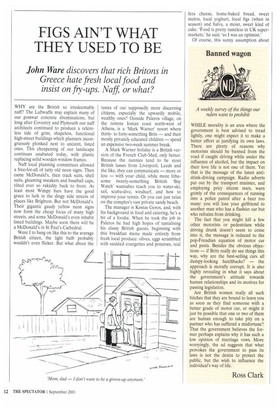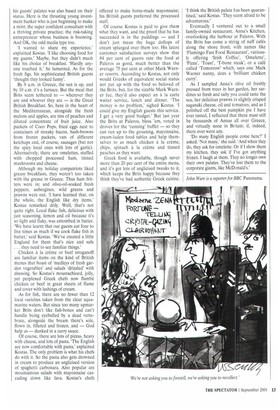FIGS AIN'T WHAT THEY USED TO BE
John Ware discovers that rich Britons in Greece hate fresh local food and insist on fly-ups. Naff or what?
WHY are the British so irredeemably naff? The Luftwaffe may explain many of our postwar concrete abominations, but long after Coventry and Plymouth our naff architects continued to produce a relentless tide of grim, shapeless, functional high-street buildings which planners incongruously plonked next to ancient, listed ones. This cheapening of our landscape continues unabated today, with plastic replacing solid wooden window frames.
Naff local planning committees allowed a free-for-all of tatty old neon signs. Then came McDonald's, then track suits, shell suits, gleaming sneakers and baseball caps, tilted ever so rakishly back to front. At least most Wimpy bars have the good grace to lurk in the dingy side streets of places like Brighton. But not McDonald's. Their gigantic gaudy yellow neon signs now form the cheap focus of many high streets, and some McDonald's even inhabit listed buildings. Maybe soon there will be a McDonald's in St Paul's Cathedral.
Were Ito bang on like this to the average British citizen, the light bulb probably wouldn't even flicker. But what about the tastes of our supposedly more discerning citizens, especially the upwardly mobile, wealthy ones? Outside Paleros village, on the remote Ionian coast north-west of Athens, is a 'Mark Warner' resort where thirtyto forty-something Brits — and their mostly privately educated children — spend an expensive two-week summer break.
A Mark Warner holiday is a British version of the French Club-Med, only better. Because the nannies tend to be stout British lasses from Liverpool, Leeds and the like, they can communicate — more or less — with your child, while more lithesome twenty-something British 'Bay Watch' wannabes teach you to water-ski, sail, scuba-dive, windsurf, and how to improve your tennis. Or you can just relax on the complex's vast private sandy beach.
The manager is Kostas Goros, and, with his background in food and catering, he's a bit of a foodie. When he took the job in Paleros he had high hopes of tantalising his classy British guests, beginning with this breakfast menu made entirely from fresh local produce: olives, eggs scrambled with sautéed courgettes and potatoes, real feta cheese, home-baked bread, sweet melon, local yoghurt, local figs (when in season) and halva, a moist, sweet kind of cake. 'Food is pretty tasteless in UK supermarkets,' he said, 'so I was an optimist.'
Of course, this sunny assumption about his guests' palates was also based on their status. Here is the thrusting young invest ment banker who is just beginning to make a mint; the super confident consultant with a thriving private practice; the risk-taking entrepreneur whose business is booming. And OK, the odd media type too.
'I wanted to share my experience,' explained Kostas. 'I like choosing food for my guests.' Maybe, but they didn't much like his choice of breakfast. `Hardly anyone touched it,' he lamented. As for the fresh figs, his sophisticated British guests 'thought they looked funny'.
By 8 a.m. in Greece, the sun is up, and by 10 a.m. it's a furnace. But the meal that Brits seem tethered to — wherever they are and whoever they are — is the Great British Breakfast. So, here in the heart of the Mediterranean, alongside the fresh melons and apples, are tins of peaches and diluted concentrate of fruit juice. Also packets of Coco Pops, fried eggs next to containers of streaky bacon, hash-browns from frozen packets, vats of different ketchups and, of course, sausages (but not the spicy local ones with lots of garlic). Alternatively, there are omelettes, stuffed with chopped processed ham, tinned mushrooms and cheese.
Although my holiday compatriots liked greasy breakfasts, they weren't too taken with the grease in Greece. Thus ham fritters were in; and olive-oil-soaked fresh peppers, aubergines, wild greens and prawns were out. 'I have learned that, on the whole, the English like dry items,' Kostas remarked drily. Well, that's not quite right. Local flake fish, delicious with just seasoning, lemon and oil because it's so light and flaky, was entombed in batter. 'We have learnt that our guests eat four to five times as much if we cook flake fish in batter,' said Kostas. 'We've created a little England for them that's nice and safe . . . they need to see familiar things.'
Chicken a la creme or beef stroganoff are familiar items on the kind of British menus that boast of 'medleys of fresh garden vegetables' and salads `drizzled' with dressing. So Kostas's moustachioed, jolly, yet perplexed Greek chefs now flambe chicken or beef in great sheets of flame and cover with lashings of cream.
As for fish, there are no fewer than 12 local varieties taken from the clear aquamarine waters. But since too many upmarket Brits don't like fish-bones and can't handle being eyeballed by a dead vertebrate, alongside the bream there's sole, flown in, filleted and frozen, and — God help us — dunked in a curry sauce.
Of course, there are lots of pizzas, heavy with cheese, and lots of pasta. 'The English are now comfortable with pasta,' explained Kostas. The only problem is what his chefs do with it. So the pasta also gets drowned in cream to produce an anglicised version of spaghetti carbonara. Also popular are mountainous salads with mayonnaise cascading down like lava, Kostas's chefs offered to make home-made mayonnaise; his British guests preferred the processed stuff.
Of course Kostas is paid to give them what they want, and the proof that he has succeeded is in the puddings — and I don't just mean the huge dollops of cream splurged over them too. His latest customer satisfaction surveys show that 84 per cent of guests rate the food at Paleros as good, much better than the average 75 per cent at other Mark Warner resorts. According to Kostas, not only would Greeks of equivalent social status not put up with the food so beloved of the Brits, but, for the sizable Mark Warner fee. they'd also expect an a la carte waiter service, lunch and dinner, The money is no problem,' sighed Kostas. 'I could give my English guests this service. I get a very good budget.' But last year the Brits at Paleros. bless 'em, voted in droves for the 'running' buffet — so they can run up to the groaning, mayonnaise, cream-laden food tables and help themselves to as much chicken a la crème, chips, spinach a la creme and tinned peaches as they want.
Greek food is available, though never more than 20 per cent of the entire menu, and it's got lots of anglicised tweaks to it, which keeps the Brits happy because they think they've had authentic Greek cuisine. 'I think the British palate has been quarantined,' said Kostas. 'They seem afraid to be adventurous.'
Eventually I ventured out to a small family-owned restaurant, Anna's Kitchen, overlooking the harbour at Paleros. With the Brits has come a string of naff cafes along the shore front, with names like 'Flamingo Fast Food Restaurant', variously offering 'Irish Coffee', 'Omelette', 'Pizza', 'Toast', 'T-bone steak', or a café called 'Tomorrow' which; says one Mark Warner nanny, does a 'brilliant chicken curry'.
As I sampled Anna's olive oil freshly pressed from trees in her garden, her sardines so fresh and salty you could taste the sea, her delicious prawns in slightly crisped saganaki cheese, oil and tomatoes, and as I polished off the best pumpkin pie I have ever tasted, I reflected that there must still be thousands of Annas all over Greece, and virtually none in Britain; if, indeed, there ever were any.
`Do many English people come here?' I asked. 'Not many,' she said. 'And when they do, they ask for omelette, Or if I show them my kitchen, they ask if I've got anything frozen. I laugh at them. They no longer own their own palates. They've lost them to the corporate giants, like McDonald's.'
John Ware is a reporter for BBC Panorama



























































 Previous page
Previous page